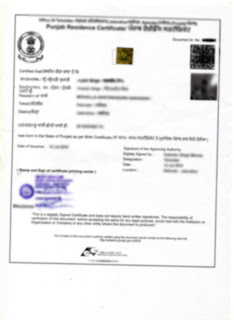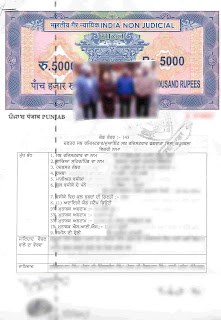Now the age of majority is
marrying without the consent of their parents simply known as love marriage. If
the bridegroom has completed the age of twenty-one
years and the bride the age of eighteen years at the time of the marriage; They
can marry without the consent of their parents.
The High Court grants police
protection to the couple who got married against parents' wishes and have a risk of life from
their families. When any couple solemnized his marriage as per their religious
customs then they can file an application for police protection in their High
Court.
DOCUMENT REQUIRED :-
1)
Proof of age
2)
Proof of address
The majority of Hindu
community is residing in India
so now we discussed all the facts on the basis of Hindu Marriage Act, 1955:-
Under section 5 of Hindu Marriage
Act, 1955 a marriage may be solemnized between any two Hindus, if the following
conditions are fulfilled, namely:
(i)
neither party has a spouse living at the time of the
marriage;
(ii)
(ii) at the time of the marriage, neither party,-
(a) is incapable of giving a valid
consent of it in consequence of unsoundness of mind; or
(b) though capable of
giving a valid consent has been suffering from mental disorder of such a kind
or to such an extent as to be unfit for marriage and the procreation of
children; or
(c) has been subject to recurrent
attacks of insanity or epilepsy;
(iii)
the bridegroom has completed the age of twenty-one
years and the bride the age of eighteen years at the time of the marriage;
(iv)
the parties are not within the degrees of prohibited
relationship unless the custom or usage governing each of them permits of a
marriage between the two; (v) the parties are not sapindas of each other,
unless the custom or usage governing each of them permits of a marriage between
the two; (vi) (Omitted).
CEREMONIES FOR A HINDU MARRIAGE:-
Under section 7 of the Hindu Marriage Act,
1955 (1) A Hindu marriage may be solemnized in accordance with the customary
rites and ceremonies of either party thereto. (2) Where such rites and
ceremonies include the saptapadi (that is, the taking of seven steps by the
bridegroom and the bride jointly before the sacred fire), the marriage becomes
complete and binding when the seventh step is taken
REGISTRATION OF HINDU MARRIAGES :-
Under section 8 of Hindu
Marriage Act, 1955:-
(1) For the purpose of
facilitating the proof of Hindu marriages, the State Government may make rules
providing that the parties to any such marriage may have the particulars
relating to their marriage entered in such manner and subject to such condition
as may be prescribed in a Hindu Marriage Register kept for the purpose. (2)
Notwithstanding anything contained in sub-section (1), the State Government
may, if it is of opinion that it is necessary or expedient so to do, provide
that the entering of the particulars referred to in sub-section (1) shall be
compulsory in the State or in any part thereof, whether in all cases or in such
cases as may be specified and where any such direction has been issued, and a person contravening any rule made in this behalf shall be punishable with fine
which may extend to twenty-five rupees. (3) All rules made under this section
shall be laid before the State Legislature, as soon as may be, after they are
made. (4) The Hindu Marriage Register shall at all reasonable times be open for
inspection, and shall be admissible as evidence of the statements therein
contained and certified extracts therefrom shall, on application, be given by
the Registrar on payment to him of the prescribed fee. (5) Notwithstanding
anything contained in this section, the validity of any Hindu marriage shall in
no way be affected by the omission to make the entry.















